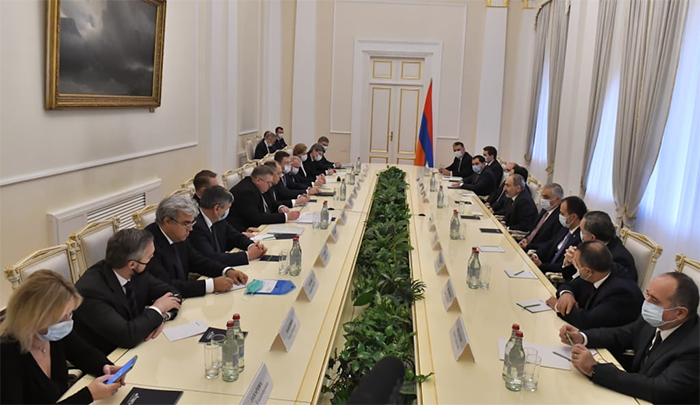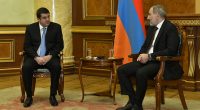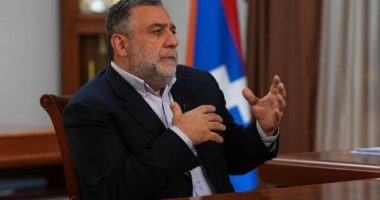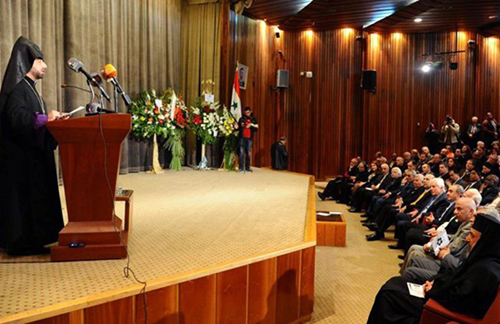YEREVAN — Russian Foreign Minister Sergei Lavrov and Defense Minister Sergei Shoigu met in Yerevan with Armenian Prime Minister Nikol Pashinyan on November 21 to discuss bilateral ties and the implementation of a Russian-brokered agreement that stopped the war in Nagorno-Karabakh.
Prime Minister Nikol Pashinyan held separate talks with the delegations headed by Shoigu and Lavrov. Shoigu, Lavrov, and other visiting Russian government members also met separately with their Armenian counterparts.
Lavrov’s delegation comprised Russia’s Deputy Prime Ministers Alexei Overchuk and Alexei Novak as well as Health Minister Mikhail Murashko and a senior official from the Federal Security Service.
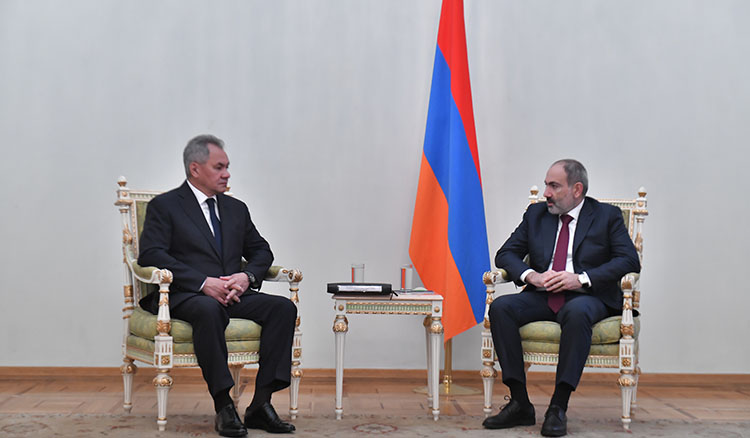

Shoigu told Pashinyan that Russian peacekeepers deployed to monitor the truce have “covered almost the entire territory” of Nagorno-Karabakh since the truce was signed on November 10.
“A total of 23 [security] posts have been deployed,” Shoigu told Pashinyan. “We’re monitoring the road to Stepanakert,” the capital of Nagorno-Karabakh.
Shoigu also said Russian troops were “ensuring the return of refugees,” adding that “peaceful life has already been established.”
“Our key task is to prevent bloodshed [in the Karabakh conflict zone] … and we certainly intend to accomplish it,” Shoigu told Pashinyan at the start of their encounter. “Besides, we want to discuss issues relating to the further presence and activities of our peacekeepers [deployed in Karabakh.]”
Shoigu said Russian-Armenian military cooperation will also be on the agenda. “We have arrived with a big program and hope to implement it,” he added.
“We hope to be able to deepen our cooperation with the Russian Federation, including in the security and military-technical areas,” Pashinyan said. He spoke of a “new military-political situation in our region” that has emerged as a result of the six-week Armenian-Azerbaijani war.
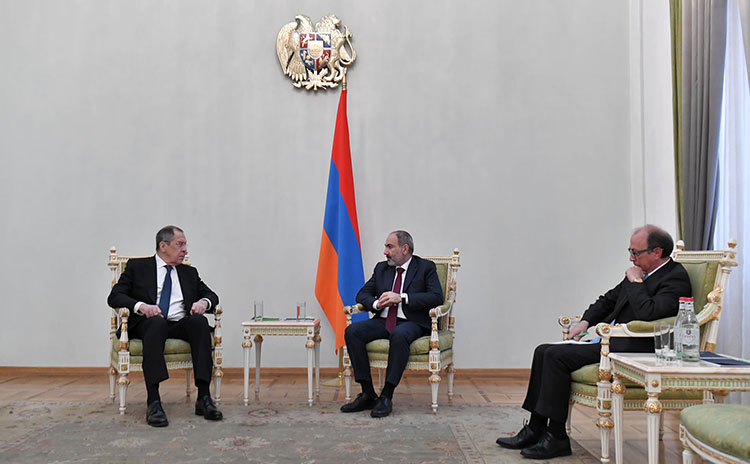

“I think that we need to take a new look at our strategic vision in the near-term and strategic context,” the Armenian leader said at the ensuing meeting with the delegation headed by Lavrov.
He also thanked Moscow for what he described as Russian assistance provided to Armenia during the war and ongoing humanitarian efforts in Karabakh.
“We reaffirm our support for the brotherly Armenian people,” Lavrov said for his part. He pointed to the Russian government’s decision to set up the Interagency Center for Humanitarian Reaction tasked with facilitating the return of ethnic Armenian refugees to Karabakh and reconstruction of the region’s civilian infrastructure.
Putin praised the Russian peacekeeping operation envisaged by the November 10 accord when he discussed the situation in the Karabakh conflict zone with Lavrov, Shoigu and other officials on Friday.
“Our troops are carrying out effective control of the ceasefire regime which is observed by both sides,” said the Russian president. “On the whole the situation has stabilized.”
Pashinian similarly commended the Russian peacekeepers for “ensuring the security of Karabakh’s residents.”
“But there are still unresolved issues,” he told Lavrov at a one-on-one meeting held early in the afternoon. “How are we going to ensure that residents of several [Karabakh] districts exercise their right to return home? Who and how will guarantee the security of our compatriots?”
Speaking to journalists after his talks in Yerevan, Lavrov said the two sides reaffirmed their commitment to fully implementing the Armenian-Azerbaijani deal brokered by Putin.
“It was unanimously emphasized that attempts to cast doubt on that statement not only inside the country but also abroad are unacceptable,” he said.
The Russian foreign minister appeared to refer to Armenian opposition groups holding street protests in Yerevan against the terms of the ceasefire condemned by them as a sellout. Some opposition leaders have demanded changes in the deal that formalized significant territorial losses suffered by the Armenian side.
After meeting with Armenian officials in Yerevan, the high-ranking Russian government delegation traveled to Baku for meetings with Azerbaijani officials on November 21.

